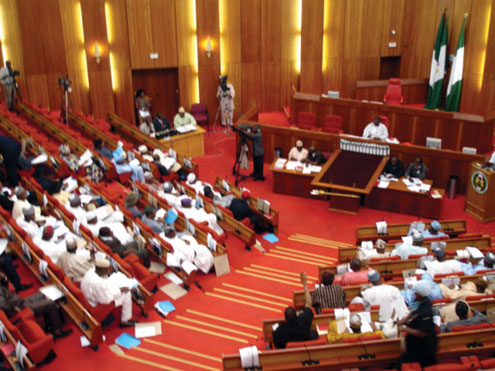Number plate: Transport unions seek policy reversal
Transport unions in the country have resolved to write to the National Assembly for the cancellation of the new driving licence and number plate policy.
They also crave for a return to the old order and want the Federal Road Safety Corps to hand over the processing of the two items to states’ Vehicle Inspection Offices to enable the corps concentrate fully on the task of highway patrol and accident prevention.
Our correspondent reliably learnt on Tuesday that the resolutions were taken after a joint meeting of the unions in Abuja on the contentious issue last week.
The President, Road Transport Employers Association of Nigeria, Mr. Femi Ajewole, who confirmed this to our correspondent on Tuesday, said the unions were also mandated to send their positions on the issue as memos to the National Assembly on Thursday (tomorrow).
The FRSC introduced the new driving licence in 2011 with new features and a price tag of N6,000. The new number plate also came on board almost at the same time, which the corps said would facilitate the establishment of a national data bank.
President Goodluck Jonathan inaugurated the two schemes on September 2, 2011.
But the Senate last month asked the FRSC to suspend the implementation of the new driving licence and number plate following allegations that the policy was exploitative.
It also mandated its Committee on Federal Character and Intergovernmental Affairs to conduct a public hearing on the new schemes.
Ajewole said the transport bodies were opposed to the new arrangement and clamoured for a return to the status quo ante.
“We met and agreed to raise a memo for them to reverse the policy and refer the matter to the VIO, which was originally saddled with the responsibility of processing the documents,” he said.
Other transport bodies represented at the meeting were the Nigerian Association of Road Transport Owners and National Union of Road Transport Workers.
The National Deputy President, NARTO, Chief Ayoola Sadiku, also confirmed that the association was preparing its position on the matter and would present it to the lawmakers in Abuja on Thursday.
Although Ajewole and other stakeholders, who spoke on the issue, expressed support for the creation of a national data bank, they insisted that it should be achieved either through the enactment of a new Act or amendment of the existing one concerning the statutory functions of the FRSC.
An auto consultant, Dr. Oscar Odiboh, supported the decision of the Senate to suspend the scheme.
He said, “The execution of the new number plates programme shows once again our lopsided priorities. FRSC has shifted its focus from preventing accidents and assisting victims on the highways to a money-making venture that lacks sincerity.
“Not only is the cost exorbitant, it smacks of hidden agenda by the FRSC, which has been battling with state governments for the income generated from number plates. The new number plates are jarred with too much information and a meaningless design that blurs what was hitherto clear.”
The Acting Public Relations Officer, PAN Nigeria Limited, Mr. Bashir Musa, however, faulted the timing of the scheme, which he attributed to the public outcry.
He said, “It came at a time when people are suffering from the hardship brought about by the January 1 increment in the price of Premium Motor Spirit popularly known as petrol.
Don’t forget that immediately after the hike in petrol price, Nigerians were also told that the price of electricity had also been reviewed upward.”
A media consultant, Mr. Manny Phillipson, said although the idea of centralising vehicle registration and driving licence issuance was good as it would curb social vices, but “it should not come with a price as FRSC has done. I would rather suggest we keep the old plates and review the data system.”





